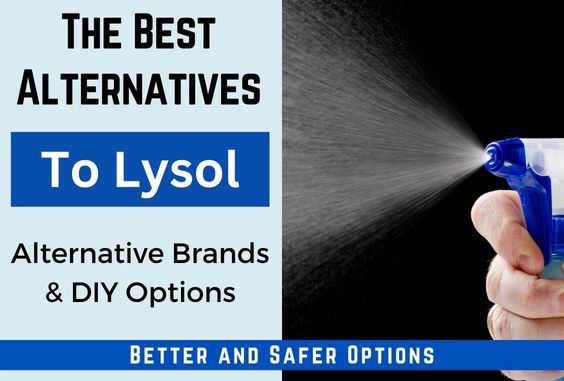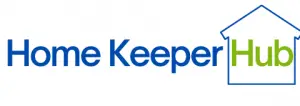
Lysol is an excellent disinfectant spray. It is said to kill 99.9% of a variety of bacteria, fungi, and viruses. However, if for some reason you cannot use Lysol, don’t worry there are many different alternatives that you can use instead.
And in this article, we will share with you a few alternative sprays, easily accessible household products, and easy DIYs that you can use.
Alternative Lysol Sprays
1- Microban Disinfectant Spray
This spray is said to kill 99.9% of bacteria and viruses, even the coronavirus. It is expected to last throughout the day and can be used on hard and soft surfaces.
Specifically, When used as directed, Microban claims to be effective against Staphylococcus aureus & Enterobacter aerogenes bacteria for 24 hours.
Additionally, When used as directed and within 5 minutes, Microban is said to be effective against other bacteria including Pseudomonas aeruginosa, and Salmonella enterica and viruses including Human Coronavirus, Influenza A H1N1, and Respiratory Syncytial Virus. However, Microban does not provide 24-hour residual virus protection.
Click here to get the Microban Disinfectant Spray on Amazon. 
Related Article: Lysol Wipes 101- What You Need to Know
2- Clorox Disinfecting Mist, Multi-Surface Disinfectant
Even though this is made by Clorox, it is a bleach-free disinfectant spray that can be used on hard surfaces as well as on soft surfaces without damaging them.
It claims to be able to kill 99.9% of germs an aerosol-free mist delivery system that does not require a wipe. Just spray and walk away. It disinfects hard surfaces, sanitizes soft surfaces, and deodorizes and freshens.
Click here to check out the Clorox Multi-Surface Disinfectant on Amazon.
3- PURELL Multi Surface Disinfectant Spray
This spray is bleach-free and contains no harsh chemicals or fumes. It can be used to disinfect most hard, non-porous surfaces and it sanitizes soft surfaces.
It claims to kill 99.9% of a variety of bacteria, fungi, and viruses including cold and flu, strep, norovirus, and human coronavirus. It can safely be used in pet areas, on toys, on kitchen sinks and counters, and on upholstered or solid furniture.
Click here to check out the price for the PURELL Multi Surface Disinfectant Spray on Amazon.
Best Natural Alternatives to Lysol
4- Vinegar
The active ingredient in vinegar is an acid (acetic acid) with a pH of 2.2. This makes it a great agent to kill bacteria, fungi, and even some viruses. It is non-toxic and quite affordable.
You can dilute your vinegar to avoid the smell or mix it with a scent that you want (usually essential oils).
The recommended concentration to use is 5% and if you are diluting it, you need at least a 1:1 ratio to make it effective. This means that you use equal parts vinegar and water. This can be used on hard and soft surfaces.
Related Article – Spraying Lysol to Clean Shoes & Kill Fungi: Does it Work
Video: How to Make a Vinegar Cleaning Solution
5- Hydrogen Peroxide
Hydrogen is another great disinfecting agent. The CDC recommends using 3% hydrogen peroxide to disinfect surfaces. Hydrogen peroxide works by generating harmful hydroxyl free radicals that may destroy DNA, membrane lipids, and other vital cell components that keep these microbes alive and flourishing in our footwear.
In addition, the CDC advises using commercially available 3% hydrogen peroxide as a stable and powerful disinfectant on inanimate objects and soft surfaces.
It can be sprayed on hard surfaces lightly and wiped off or allowed to air dry. It can also be diluted and lightly sprayed on soft surfaces (not enough to be saturated so that it can quickly air dry or be wiped).
Video: 7 Cool Ways to Use Hydrogen Peroxide!
6- Alcohol
Any kind of alcohol that is 70% concentrated or higher is very effective at killing most bacteria. Fungi and viruses. Alcohol is constantly used even in hospitals to disinfect and sterilize surfaces and equipment. It can be used on almost all hard surfaces and many soft surfaces.
If you are wiping down or spraying furniture, fabrics or other soft materials, keep the cleaning instructions in mind to avoid damaging the material. The most commonly used ones are rubbing alcohol or vodka.
These can be easily obtained from any pharmacy or supermarket. The best way to use this is to spray it directly onto the surface you are cleaning. It can either be wiped with a clean cloth or allowed to air dry (which it does easily).
Video: 5 AMAZING HACKS Using Only Rubbing Alcohol!
7- Essential Oils
There are many essential oils with antimicrobial properties. However, they are mostly added to DIY cleaners and sprays to add to their cleaning properties and to add scents. Essential oils are very aromatic so they help to deodorize strongly as well as clean.
Some great recommendations are tea tree oil, lemon oil, lavender oil, eucalyptus oil, wild orange oil, peppermint oil, pine oil, cinnamon oil, and thyme oil. A great brand of essential oils available in a variety of flavors is Handcraft.
Click here to view and purchase Handcraft essential oils.
8 – Soap + Water
If you do not have any of the things discussed above, then good ol’ soap and water is a great cleaner for your home as well. It can be regular soap or an antibacterial soap that is mixed with water.
You can saturate a clean cloth and wipe down any surface, or you can put the solution in a spray bottle and spray your surfaces. This will not dry as quickly as commercial sprays, alcohol, or peroxide, but it can be wiped clean in no time. A great recommendation is Castile soap.
Click here to view and purchase Dr. Bronner’s Pure-Castile Liquid Soap on Amazon.
DIY Disinfectant Sprays
To make your disinfectant sprays, you can use a combination of easily available ingredients that are most suitable for you and the area you are going to clean.
1- The Essential Oil Medley Disinfectant Spray
This recipe can be modified to make just an alcohol disinfectant (add 2 cups of water and leave out the vinegar) or a vinegar all-purpose cleaner (add 1 cup of water and leave out the alcohol) based on your preference and/or needs.
Ingredients/Materials:
- 1 cup vodka or rubbing alcohol, 90% alcohol content or higher (the higher the better)
- 1/4 cup white vinegar, at least 5% acidity
- 7 (or more/less) drops of each of these essential oils: juniper, cypress, Laurus nobilis (bay laurel), oregano, and clove (or any other combination of essential oils of your choice)
- Spray bottle
Method:
- Combine all of the ingredients in your spray bottle.
- Shake well to combine
- Spray onto your surfaces and let them air dry. Do not spray too much that will need to be wiped off.
- Spray lightly on soft surfaces. Do not saturate. Allow to air dry.
2- The Bleach Solution
This can be used for hard surfaces that are safe to be bleached without getting damaged.
Ingredients/materials
- Spray bottle
- Bleach
- Water
- Scented Detergent or essential oil
Method:
- Combine equal parts bleach and water in your spray bottle
- Add some of the scented detergent or a few drops of your chosen essential oil for a pleasant smell.
- Spray onto your surface and wipe with a clean cloth.
3- The Castile Spray
Castile soap is gentle and non-toxic. It is even safe for your skin so it can be used on any surface.
Ingredients/Materials
- Castile liquid soap
- Water
- Spray Bottle
Method:
- Add ¼ cup of your chosen castile soap (there are different scents) and 1 cup of water to your spray bottle.
- Shake gently to combine well.
- Spray on your surfaces to clean.
Sources:
Sanitizing Spray, Citrus Scent
Clorox® Disinfecting Mist, Multi-Surface
